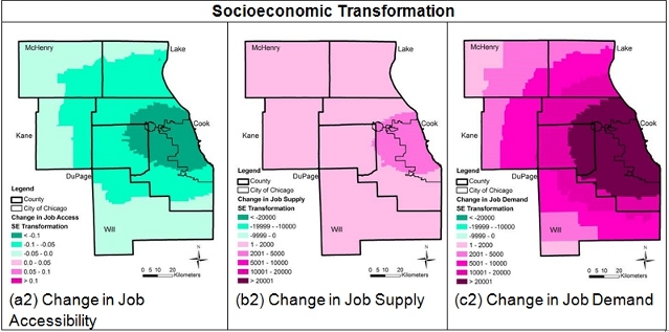 Under global capitalism, goods are not produced in one place and sold in another. Production often involves multiple mobilities across the US-Mexico border. International corporations leverage cross-border inequalities for profit: lower wages, longer hours, and weaker environmental regulation all have been the source of international arbitrage. Surprisingly, Victoria Hattam has found international arbitrage to be a two-way street. The Texas Right to Work laws have created weaker employment protections in Texas than in Mexico. Focusing on questions of dismissal, inequalities do not always line up north to south. Multi-directional inequalities are in play. Hattam concludes by noting that states’ rights claims are nested within a deeper history of racial capitalism.
Under global capitalism, goods are not produced in one place and sold in another. Production often involves multiple mobilities across the US-Mexico border. International corporations leverage cross-border inequalities for profit: lower wages, longer hours, and weaker environmental regulation all have been the source of international arbitrage. Surprisingly, Victoria Hattam has found international arbitrage to be a two-way street. The Texas Right to Work laws have created weaker employment protections in Texas than in Mexico. Focusing on questions of dismissal, inequalities do not always line up north to south. Multi-directional inequalities are in play. Hattam concludes by noting that states’ rights claims are nested within a deeper history of racial capitalism.
Since the 1970s, globalization has been a cross-border enterprise in which companies leverage inequalities across territorial lines. Differences in wages, working conditions, and environmental regulations all can be arbitraged (sold at different prices in different places) for profit. In some definitional sense, border crossing is what makes globalization global. The US-Mexico border is no exception. Numerous brand name companies – Panasonic, LG, Toyota, KIA, TRICO among many others – have located their production along the US-Mexico border. Manufacturing facilities generally are placed in enormous industrial parks on the Mexican side of the border while management and distribution systems are in the United States.
Cross-border production and arbitrage
Objects are not made on one side of the border and sold on the other; they are made across or on top of the border by moving parts to be assembled, people, and money moving back and forth across the border. Christopher Wilson from the Woodrow Wilson Center in Washington DC estimates that cars move back and forth across the border eight times while they are being built. If anything, I think this figure greatly underestimates the extent of cross-border production networks. Moreover, repeated reference to supply chains and value chains are misleading because they imply more linear production processes than the multi-directional mobilities that constitute actual global production networks.
Leveraging inequalities for profit is not new. But this is not the end of the story. To my surprise, during my research I learned that corporate arbitrage is not a one directional process. Several people I spoke to explained that corporations not only take advantage of lower wages, longer hours, and more limited environmental protections in Mexico – they also arbitrage in the opposite direction – from south to north by taking advantage of weaker employment protections in Texas. After the Second World War, several southern states passed Right to Work laws limiting labor union power in contrast to national level protections of the right to organize and strike having been enacted by Congress. Texas was an early adopter, passing a Right to Work law in 1947. Ever since, there have been very different employment protections on both sides of the border. Although wages, hours, and environmental regulation are lower, longer, and weaker in Mexico, not all inequalities line up in the same direction. In some instances, labor protections are weaker in Texas than in Mexico.

“Texas Mexican Railway International Brid” (CC BY-NC 2.0) by cmh2315fl
Protections against unfair dismissal stronger in Mexico than in Texas and the UK
An important point of difference between Texas and Mexico are the policies around dismissal. The Texas Right to Work Law stipulates employment at will – meaning that employees can be dismissed without cause. In Mexico, by contrast, Article 47 of Federal Labor Law ensures that after a thirty-day probationary period, employers must follow a mandatory procedure including specifying the grounds of dismissal. Simply put, it is harder to dismiss employees in Mexico than it is in Texas. Comparing Mexico with Texas might seem odd since the units of analysis differ; one is a nation state and the other a subnational territory. Nevertheless, the comparison is warranted because these are the jurisdictional homes for the relevant policies.
The strength of Mexican employment protections come into sharper focus when we compare legal protections offered in Mexico with those currently in place in the UK. Protection against unfair dismissal only kicks in the UK after a two-year probationary period. This is a considerably longer probationary period during which employees can be terminated without just cause. The introduction of zero-hour contracts in the UK intensifies the downward pressure on employment protections. Comparing all the three cases – Mexico, the UK and Texas – probationary periods for new hires are as follows: Mexico, thirty days, the UK, two years, and Texas, permanent employment at will. Formal protections against unfair dismissal are strongest in Mexico. A full assessment of labor protections requires taking company unions and labor movement strength into account. But even with a broader lens, Texas has minimal protection in place.
States’ Rights and Racial Capitalism
Bringing Texas Right to Work laws into view shifts accounts of globalization in two important respects. First, the Texas laws bring domestic inequalities into view. The point is not to diminish the importance of offshoring; arbitraging inequalities abroad; they remain crucial. Nevertheless, we also need to attend to the ways that governments and companies leverage inequalities on the US side of the border. Arbitrage is a two-way street.
Second, Texas Right to Work laws need to be understood within the long history of states’ right claims in the United States. Appeals to states’ rights have been used as a bulwark against national government authority ever since the founding of the country. The 1947 Texas statute carries with it the ghosts of southern investment in slavery as well as opposition to New Deal labor union protections and President Franklin D. Roosevelt’s early anti-discrimination policies. Political scientist William H. Riker famously captured the connection in the final sentence of his 1964 book on federalism which boldly declares, “if in the United States one disapproves of racism, one should disapprove of federalism”. The point being that during fights over slavery, labor regulation, and civil rights, federalism has provided states with a degree of institutional protection against the imposition of uniform national policies. Joseph Lowndes’ 2008 brilliant account of the roots of modern conservatism traces the political formation showing how previously disparate political strands of economic and social conservatism were fused with racial animus to forge a new conservative political identification. The connections were neither natural, nor inevitable. It took extensive political effort to bring them together.
Right to Work laws are important mechanisms through which racial capitalism was made and is being remade. The ghosts of slavery, the Civil War, anti-labor union politics now have been hitched to cross-border production under globalization. Specifying the mechanisms through which globalization operates identifies sites for contemporary contestation and change. It is important that attention to outsourcing does not obscure the inequalities within.
- Please read our comments policy before commenting.
- Note: This article gives the views of the author, and not the position of USAPP – American Politics and Policy, nor the London School of Economics.
- Shortened URL for this post: https://wp.me/p3I2YF-dPX







V interesting insight. Especially agree with comments on zero hours contracts in the UK.
Really interesting take on how supply chains are entangled with regulatory regimes!
An illuminating look at regulatory complexities. I suppose developers shop for advantageous regulatory regimes to solve many problems: low environmental regs for toxic manufacturing or extracting industries, relaxed intellectual property controls for pharmaceutical or entertainment products, even permissive medical guidelines for cosmetic or transhumanist surgeries. Harmonizing cross-border regulations — as the EU has shown — can be a long, contentious and sometimes fruitless process.
Loved the macro-micro connection ( very usefully informative) and the reminder that domestic & local politics impact global developments